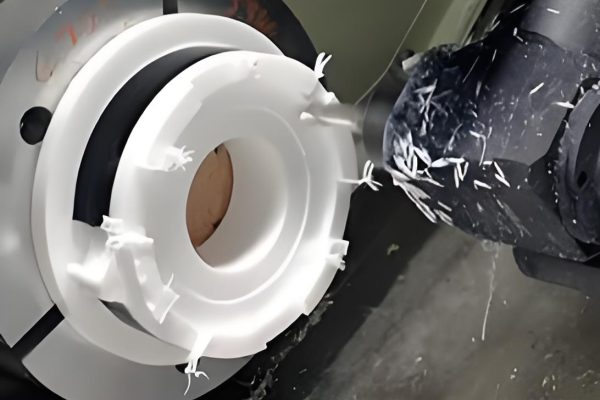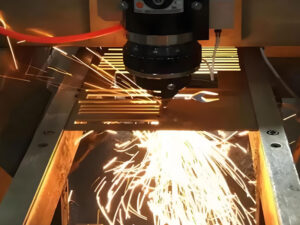PTFE (Teflon)
Professional PTFE CNC Machining Manufacturer
- Material Certification
- Factory Prices
- No minimum order
Professional PTFE CNC Machining Services
Polytetrafluoroethylene (PTFE), commonly known as “Plastic King” or Teflon, is a high-temperature resistant, cold-resistant, acid and alkali resistant and organic solvent resistant polymer materials. It can be used for a long time at -180 to 260ºC, with a very low coefficient of friction, high chemical stability, electrical insulation and good resistance to aging.
These properties of PTFE have led to a wide range of applications in a variety of industries including, but not limited to, oil and gas, chemical processing, industrial, electrical/electronic and construction industries.
Allied Metal brings over 20 years of CNC machining expertise, equipped with advanced machinery and a skilled team.
Our ISO9001-certified shop handles any custom design, from simple to complex projects.
We offer rapid prototyping, low-volume machining, and high-volume production.
Our precise CNC services include milling, turning, and lathe work, supporting all stages of your product development.

About the material PTFE
Following are the characteristics of PTFE materials:
- High and low temperature resistance
- Corrosion resistance
- Weather resistant
- High lubrication
- Non-adhesive
- Non-toxic
- Electrically insulating
- Physiologically inert
Available Materials
Following are the 5 common grades of PTFE:
Native PTFE
“Virgin PTFE” (PTFE without fillers) is one of the most chemically inert materials known and is used in many different applications and industries.
R-PTFE
Glass Fiber Filled PTFE. Virgin PTFE contains 20-30% glass fiber fillers, which significantly increases compressive strength and reduces deformation under load.
Br-PTFE
Bronze filled PTFE. Adding bronze to PTFE provides better dimensional stability and reduces creep, cold flow and wear.
Stainless Steel Filled PTFE
This material is very wear resistant and has excellent strength and stability under extreme loads and high temperatures while maintaining the low coefficient of friction of traditional PTFE.
PTFE grades can be selected from pure PTFE and filled PTFE grades depending on the required service conditions/properties needed for the application. If you require additional material details or have a product you would like to quote please contact us directly.
The table below details the filler content, basic properties and areas of application for common grades of PTFE and filled PTFE, PTFE.
Grade | Filler Content by Weight % | Standard Series | Properties | Applications |
Native PTFE | - | Yes | Hygienic | Gaskets, Bellows, |
R-PTFE | 15 - 25 | Yes | High compressive strength | Ball valve component, bridge bearing pads, ship launching pads,pipe supporting pads. |
Br-PTFE | 40 - 60 | Yes | High compressive strength | Wear Strips Machine tool liners, hydraulic seals. |
Stainless Steel Filled PTFE | 5 - 10 | Yes | High compressive strength | Low torque valve components |
Applications for PTFE plastic
Due to its high chemical stability, PTFE is resistant to strong acids, alkalis and organic solvents, and is widely used in the manufacture of corrosion-resistant pipelines, valves and equipment linings to ensure stable operation of equipment in extreme chemical environments.
PTFE material’s wear resistance and low coefficient of friction make it an ideal material for bearings, guide rails and seals, which are widely used in mechanical and metallurgical industries to prevent wear and leakage.
PTFE’s excellent electrical insulation performance is commonly used in the manufacture of wires, cables and electronic components with high insulating properties, which is crucial in the electronics industry due to its low dielectric constant and high resistivity.
Good non-stick and biocompatibility make PTFE suitable for medical device coatings and seals, such as artificial blood vessels, heart valves, etc., to help reduce throm
Because of its excellent thermal and chemical stability, PTFE is commonly used in seals and coatings for aero-engines to keep equipment safe in high-temperature and high-pressure environments.
Used as coatings, guide grooves, sealing gaskets and scrapers in food processing equipment to prevent food adhesion and maintain hygiene.

Our PTFE CNC Machining Services
Frequently Asked Questions About PTFE CNC Machining
PTFE CNC machining is a computer-controlled process for molding polytetrafluoroethylene (PTFE), a soft, chemically resistant thermoplastic.
CNC (Computer Numerical Control) ensures the precision of complex parts made from PTFE. Given PTFE’s unique properties, such as high heat resistance and non-reactivity, CNC machining is critical to producing parts for industries such as medical, aerospace and food processing, where precision and material integrity are essential.
PTFE (polytetrafluoroethylene) is safe for use in the food industry.
PTFE material has strong corrosion resistance, high temperature resistance, low coefficient of friction and non-toxic environmental characteristics, and is widely recognized and used in the food industry to ensure food safety and hygiene standards.
PTFE has its own unique advantages and limitations when compared to other plastics for CNC machining.
Advantages: excellent corrosion resistance for long term use in any type of chemical medium; excellent chemical and temperature resistance.
Limitations: difficult to machine due to its high melting point, but this does not prevent it from being used in specific applications.
PTFE parts can not only be recycled after CNC machining, but also in the modern industry and environmental protection requirements, this recycling not only has economic value, but also helps to reduce environmental pollution and promote sustainable development.



